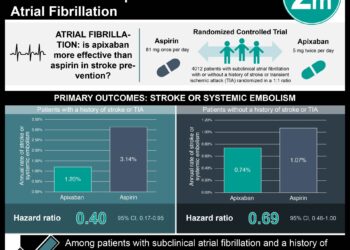Low-dose aspirin may reduce risk of preeclampsia
Image: PD
1. From a systematic review, the U.S. Preventative Services Task Force (USPSTF) has determined that aspirin use decreases the risk of preeclampsia, intrauterine growth restriction, and preterm birth.
Evidence Rating Level: 1 (Excellent)
Study Rundown: One of the leading causes of maternal death globally is preeclampsia, and since the only effective treatment is delivery, improving preventative care remains the primary goal. Some studies have found antiplatelet agents, primarily aspirin, may decrease the risk of preeclampsia. Thus, the USPSTF conducted this review to determine the efficacy of aspirin treatment. From 23 studies included in the review, women taking aspirin had a statistically significant decreased risk of preeclampsia, intrauterine growth restriction, and preterm birth. There was a non-significant decrease in perinatal death, and both the timing and dose of aspirin did not show any meaningful difference. Furthermore, there were no statistically significant increases in the risk of placental abruption, postpartum hemorrhage, or neonatal hemorrhage due to aspirin treatment. The major limitation of this review was the evidence of small-study effects, which may have overestimated the benefits of aspirin treatment. But all together, there is strong evidence that aspirin prophylaxis may decrease risk of preeclampsia in high-risk patients.
Click to read the study, published today in Annals of Internal Medicine
Relevant Reading: Antiplatelet agents for preventing pre-eclampsia and its complications
In-Depth [systematic review]: From review of 73 articles, 23 studies met inclusion criteria, including 15 randomized, controlled trials that evaluated maternal and perinatal health benefits and 13 that included preeclampsia data. From a pooled analysis, aspirin use was associated with reduced risk of preeclampsia (absolute risk (AR)=5 vs. 2%, relative risk (RR)=0.76 [CI=0.62-0.95], intrauterine growth restriction (AR=5 vs. 1%, RR=0.80 [CI=0.65-0.99]), and preterm birth (AR=4 vs. 2%, RR=0.86 [CI=0.76-0.98]). There was also a trend toward decreased perinatal death (RR=0.81 [CI=0.65-1.01]) that was not statistically significant. There was a very small trend, not statistically significant, towards an increased risk of placental abruption with aspirin treatment (RR=1.17 [CI=0.93-1.48]) and no difference in postpartum hemorrhage (RR=1.02 [CI=0.96-1.09]. For preeclampsia, this review was limited by moderate heterogeneity (I2=40.5%; p=0.064) and small-study effects (Peter test, p=0.028). Furthermore, there was little data on potential long-term effects of aspirin use, so its benefit and harms beyond short-term analysis are unknown. Additionally, no direct maternal health benefits were determined, but decreasing the risk of preeclampsia may reduce the need for medical intervention overall.
More from this author ACP recommends weight loss and CPAP for obstructive sleep apnea Lifestyle interventions can reduce type 2 diabetes among high-risk patients Home scoring system may prevent unnecessary pharyngitis clinic visits No evidence for the cognitive side-effects of statins Household firearm accessibility increases risk of suicide and homicide Transcatheter aortic valve replacement provides only minor benefit to quality of life No difference in statin-related myalgias compared to placebo in single-patient trials
© 2012-2014 2minutemedicine.com. All rights reserved. No works may be reproduced without expressed written consent from 2minutemedicine.com. Disclaimer: We present factual information directly from peer reviewed medical journals. No post should be construed as medical advice and is not intended as such by the authors, editors, staff or by 2minutemedicine.com. PLEASE SEE A HEALTHCARE PROVIDER IN YOUR AREA IF YOU SEEK MEDICAL ADVICE OF ANY SORT.







